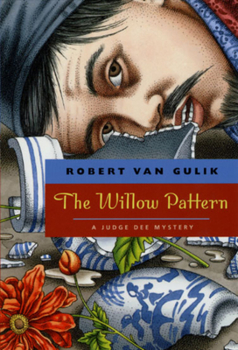The Willow Pattern: A Judge Dee Mystery
(Book #12 in the Judge Dee Series)
Select Format
Select Condition 
Book Overview
Judge Dee has been appointed emergency governor of the plague- and drought-ridden Imperial City. As his guards help the city fend off a popular uprising, an aristocrat from one of the oldest families in China suffers an "accident" in a deserted mansion. In The Willow Pattern, the illustrious judge uses his trademark expertise to unravel the mysteries of the nobleman, a shattered vase, and a dead bondmaid. Along the way he encounters...
Format:Paperback
Language:English
ISBN:0226848752
ISBN13:9780226848754
Release Date:October 1993
Publisher:University of Chicago Press
Length:192 Pages
Weight:0.35 lbs.
Dimensions:0.5" x 5.2" x 7.9"
Customer Reviews
4 ratings
Murder During a Time of Plague
Published by Thriftbooks.com User , 16 years ago
A mysterious plague is ravaging the Imperial City. Newly appointed Governor Judge Dee, must maintain civil order as the social bonds start to slowly unravel. If this were not enough, a leading merchant is found dead at the foot of a staircase. Was it a tragic accident or was he murdered? Judge Dee begins a new investigation. In my mind, the mystery and how it is resolved is always of secondary importance in a Judge Dee story. I read the series for Robert Van Gulik's richly imagined recreation of Seventh Century, Tang China. Once again, "The Willow Pattern" does not dissapoint. Van Gulik feels as comfortable walking the streets of a crowded urban slum as he does in the rarified homes of wealthy merchants. "The Willow Pattern" was first published in 1965 and is still in print. The reason for the series longevity is the heady mix of a solid mystery combined with the detailed recreation of a fascinating era. Judge Dee stories are well crafted and are a pleasant read.
I love a mystery told well and this is one of those.
Published by Thriftbooks.com User , 17 years ago
I've gotten hooked on the Judge Dee Mysteries. I was always a fan of the Charlie Chan movies and to find a series of books that are more authentic and set in ancient China is a real treat! Written so well and captivatingly.
Judge Dee & Old Chinese Justice
Published by Thriftbooks.com User , 20 years ago
Published in 1965, the historical mystery, The Willow Pattern, A Judge Dee Mystery by Robert van Gulik, portrays 7th century AD China and Judge Dee, the Lord Chief Justice in China's Imperial Capital. The author, a Dutch scholar writes in the manner of a traditional 18th century Chinese writer of 7th century Chinese mystery stories. Although historically Judge Dee was a magistrate in the Tang Dynasty, the stories are set in the Ming Dynasty. The antecedents of this popular mystery series is only the first complications the reader meet. Judge Dee (probably based on a real character) is an intelligent and canny Confucian Magistrate who always delivers impartial and fair justice to all. Populist hero Judge Dee and his justice are not always in line with the Imperial Rule justice. But Judge Dee's justice always solved the crimes and sends the evildoers to their doom. But, justice did depend on Judge Dee and how he alone decided to investigate, interpret the facts, interpret the law, pass judgment and decide the sentence (if any) based on his judgment and knowledge of the case. There was no appeal after Judge Dee declared the verdict. Fair, impartial justice under the old Confucian system in China was solely dependent on the judgment of the magistrate. The mystery story, The Willow Pattern illustrates how arbitrary Chinese justice can be under the old Confucian system. Ordinary citizens of China were regulated differently from the nobility. Women were, of course even lower in status than ordinary citizens. The ability to defend their life with deadly force, a natural law that we take for granted in America, is illustrated in The Willow Pattern, "Women of the underworld sometimes carry an iron ball of about the size of a large egg in the tip of each sleeve. Since the law forbids ordinary citizens to carry daggers or other cutting weapons on their person, on the penalty of a flogging, those women have developed a special art of fighting with loaded sleeves." The "loaded sleeves" were considered deadly weapons. The people accepted their place in life since it was the will of heaven that the rulers had a mandate to rule. When they had a bad master they understood that they were expected to accommodate the situation as their fate. Speaking of a bad man (Yee) who was their master, Cassia explains, "He was a bad man, but he was our master. Heaven willed it so." Justice was also the will of heaven so when it was not arbitrary that was a blessing but not to be counted on. The story here occurs during a time of plague and Judge Dee rules alone in the Imperial City and wears many different hats. He must administer and safeguard the city's food stores, manage the military (normally separate from civilian control) and deal with the disposal of the plague victims. Judge Dee also investigates charges of wrongdoing, conducts inquests concerning suspicious deaths and arbitrates civil affairs. He also prosecutes, defends, adjudicate and oversee sentencing of c
Great!
Published by Thriftbooks.com User , 24 years ago
This book is great! I have read it 4 times!





